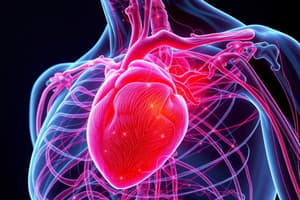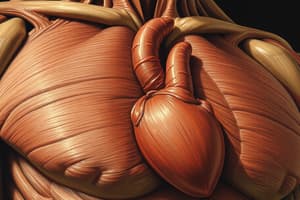Podcast
Questions and Answers
What is a defining characteristic of skeletal muscle tissue?
What is a defining characteristic of skeletal muscle tissue?
- Multinucleate cells (correct)
- Involuntary control
- Uninucleate cells
- Branching cells
Which function is associated with cardiac muscle tissue?
Which function is associated with cardiac muscle tissue?
- Voluntary movement
- Pumping blood into circulation (correct)
- Facial expression
- Locomotion
Where is cardiac muscle primarily located?
Where is cardiac muscle primarily located?
- In the walls of the lungs
- In the skin
- In skeletal muscles attached to bones
- In the walls of the heart (correct)
Which of the following best describes the microscopic observation of cardiac muscle?
Which of the following best describes the microscopic observation of cardiac muscle?
Which trait distinguishes smooth muscle from both skeletal and cardiac muscle?
Which trait distinguishes smooth muscle from both skeletal and cardiac muscle?
Which characteristic is unique to cardiac muscle compared to skeletal and smooth muscle?
Which characteristic is unique to cardiac muscle compared to skeletal and smooth muscle?
Which of the following muscle types propels food and is located in the walls of hollow organs?
Which of the following muscle types propels food and is located in the walls of hollow organs?
What is the primary function of skeletal muscle?
What is the primary function of skeletal muscle?
Which statement correctly describes the control of smooth muscle?
Which statement correctly describes the control of smooth muscle?
Which muscle type would you expect to find in the heart?
Which muscle type would you expect to find in the heart?
What is the primary characteristic of the nuclei in smooth muscle cells?
What is the primary characteristic of the nuclei in smooth muscle cells?
Which feature distinguishes smooth muscle tissue from skeletal muscle?
Which feature distinguishes smooth muscle tissue from skeletal muscle?
How are smooth muscle cells arranged within the tissue?
How are smooth muscle cells arranged within the tissue?
What is a primary function of smooth muscle tissue?
What is a primary function of smooth muscle tissue?
Where is smooth muscle tissue predominantly located in the body?
Where is smooth muscle tissue predominantly located in the body?
Which statement accurately describes cardiac muscle?
Which statement accurately describes cardiac muscle?
What is true regarding smooth muscle cells?
What is true regarding smooth muscle cells?
Which of the following best describes striations in muscle tissue?
Which of the following best describes striations in muscle tissue?
How does skeletal muscle primarily differ from cardiac and smooth muscle?
How does skeletal muscle primarily differ from cardiac and smooth muscle?
What distinguishes involuntary muscle from voluntary muscle?
What distinguishes involuntary muscle from voluntary muscle?
Which muscle is primarily responsible for elevating the mandible during chewing?
Which muscle is primarily responsible for elevating the mandible during chewing?
Which muscle functions to close the eyelids?
Which muscle functions to close the eyelids?
What is the main action of the buccinator muscle?
What is the main action of the buccinator muscle?
Which of the following muscles is located at the back of the neck and assists in head extension?
Which of the following muscles is located at the back of the neck and assists in head extension?
Which muscle is NOT involved in facial expression?
Which muscle is NOT involved in facial expression?
What is the primary action of the orbicularis oris muscle?
What is the primary action of the orbicularis oris muscle?
Which muscle is responsible for depressing the lower lip?
Which muscle is responsible for depressing the lower lip?
Which of the following muscles originates from the occipital bone?
Which of the following muscles originates from the occipital bone?
Identify the muscle associated with the action of elevating and protracting the mandible.
Identify the muscle associated with the action of elevating and protracting the mandible.
Which muscle's insertion point is the lower edge of the mandible?
Which muscle's insertion point is the lower edge of the mandible?
What is the primary purpose of studying antagonistic muscle arrangements?
What is the primary purpose of studying antagonistic muscle arrangements?
Which of the following is essential for accurately identifying muscles using models and charts?
Which of the following is essential for accurately identifying muscles using models and charts?
What task involves both examining and labeling diagrams of a whole muscle?
What task involves both examining and labeling diagrams of a whole muscle?
Which action should be taken to begin studying the musculature of the human head?
Which action should be taken to begin studying the musculature of the human head?
Why is it important to label an unlabeled diagram of a whole muscle?
Why is it important to label an unlabeled diagram of a whole muscle?
Which muscle is responsible for flexing the leg at the knee while also extending the thigh?
Which muscle is responsible for flexing the leg at the knee while also extending the thigh?
Which muscle's origin is located on the pubis and is primarily involved in thigh adduction?
Which muscle's origin is located on the pubis and is primarily involved in thigh adduction?
Identify the muscle that extends the leg at the knee and has its origin on the ilium.
Identify the muscle that extends the leg at the knee and has its origin on the ilium.
What action is primarily performed by the tibialis anterior muscle?
What action is primarily performed by the tibialis anterior muscle?
Which muscle inserts into the calcaneus via the Achilles tendon and functions to plantar flex the foot?
Which muscle inserts into the calcaneus via the Achilles tendon and functions to plantar flex the foot?
Which term refers to the movement of a bone toward the midline?
Which term refers to the movement of a bone toward the midline?
What structure surrounds and binds together individual muscle fibers within a fascicle?
What structure surrounds and binds together individual muscle fibers within a fascicle?
What is the role of the antagonist muscle pair in movement?
What is the role of the antagonist muscle pair in movement?
What action is described as increasing the angle at a joint?
What action is described as increasing the angle at a joint?
What is the primary action of the muscles located in the posterior compartment of the arm?
What is the primary action of the muscles located in the posterior compartment of the arm?
Which term accurately describes the action of turning the palm upward?
Which term accurately describes the action of turning the palm upward?
Which nerve innervates the flexors of the forearm?
Which nerve innervates the flexors of the forearm?
Which compartment of the forearm is responsible for extending the wrist and fingers?
Which compartment of the forearm is responsible for extending the wrist and fingers?
What is the action of the muscles found in the anterior compartment of the arm?
What is the action of the muscles found in the anterior compartment of the arm?
Which of the following correctly classifies the biceps brachii?
Which of the following correctly classifies the biceps brachii?
Flashcards are hidden until you start studying
Study Notes
Muscle Tissue Types
- Skeletal Muscle: Long, cylindrical cells, multinucleate, striations present. Function: Voluntary movement, locomotion, manipulation of the environment, facial expression. Location: Attached to bones or skin.
- Cardiac Muscle: Branching cells, uni/binucleate, striations present. Function: Contraction, propels blood into circulation. Location: Heart. Control: Involuntary.
- Smooth Muscle: Spindle-shaped cells, single central nucleus, striations absent. Function: Propels food, urine, feces; walls of hollow organs. Location: Walls of hollow organs. Control: Involuntary.
Skeletal Muscle Details
- Microscopic Examination: Long, unbranching, multinucleated fibers with prominent striations.
Cardiac Muscle Details
- Microscopic Examination: Branching, striated cells with intercalated discs that appear as transverse lines between the muscle fibers.
Smooth Muscle Details
- Microscopic Examination: Tapered ends, no striations or intercalated discs.
- Arrangement: Cells arranged closely to form sheets.
- Nuclei: Central nuclei.
Muscle Terminology
- Cardiac muscle: The myocardium, the muscle of the heart.
- Intercalated discs: Junctions between adjacent cardiac muscle cells.
- Involuntary muscle: Muscle that contracts without conscious control (smooth and cardiac muscles).
- Skeletal muscle: Striated muscle tissue that attaches to the skeleton and moves it. It is under voluntary control.
- Smooth muscle: Involuntary, non-striated, spindle-shaped muscle cells. They are found in blood vessel walls and the walls of the gut and urinary tract and are responsible for peristalsis.
- Striations: Stripes visible in cardiac and skeletal muscle cells. They are due to the arrangement of protein filaments within the cells.
- Voluntary muscle: Muscle under conscious control; skeletal muscle.
Muscle Action Terminology
- Abduction: Moves a bone away from the midline.
- Adduction: Moves a bone toward the midline.
- Dorsiflexion: Points toes upward.
- Eversion: Turns sole outward.
- Extension: Increases the angle at a joint.
- Flexion: Decreases the angle at a joint.
- Inversion: Turns sole inward.
- Plantar Flexion: Points toes downward.
- Pronation: Turns palm downward.
- Protraction: Moves a part forward (usually mandible).
- Retraction: Moves a part backward (usually mandible).
- Rotation: Causes a part to pivot upon its axis.
- Supination: Turns palm upward.
Miscellaneous Muscle Terms
- Antagonistic muscle pair: Two muscles that have opposite actions (e.g., biceps and triceps of the arm).
- Aponeurosis: A sheet of dense fibrous connective tissue linking a muscle to the part it moves.
- Endomysium: Thin connective tissue surrounding each muscle cell.
- Epimysium: Connective tissue that surrounds the whole muscle.
- Fascicle: A bundle of muscle fibers bound together by connective tissue.
- Insertion: Attachment of a muscle that allows the most movement.
- Muscle Belly: The main body of a muscle.
- Muscle Fiber: A muscle cell.
- Origin: Attachment of a muscle that remains relatively fixed during muscular contraction.
- Perimysium: Connective tissue surrounding each muscle fascicle.
- Tendon: A cord of dense fibrous connective tissue connecting a muscle to a bone.
Studying That Suits You
Use AI to generate personalized quizzes and flashcards to suit your learning preferences.



